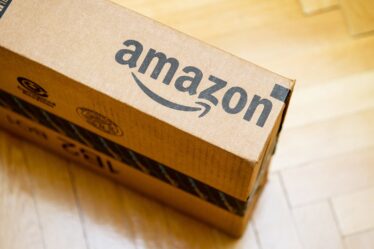This is the final part of a three-part series by The Business of Beauty, which explores how Black founders built, launched and scaled their businesses.
“I can see a massive market share … in the clown market.”
It’s been nearly a decade since investor and Canadian businessman Kevin O’Leary poked fun at Melissa Butler and Rosco Spears, founders of makeup line The Lip Bar, on national television — suggesting their vegan, shea-butter-infused lipsticks with unconventional colours would only find success among circus and theatre performers.
Butler and Spears, founders of the Detroit, Mich.-based beauty brand, pitched their concept on the ABC series hoping to secure a $125,000 investment from one of the show’s five investors. Despite emphasising multiple times that their lipsticks catered to women of colour who often struggled to find flattering shades in typical beauty aisles, the founders faced rejection and even mockery from the investors who couldn’t seem to grasp that Black women had unique cosmetic needs — and would be willing to pay for products addressing those needs.
That rejection and the heavy lift of educating investors on the market for beauty products for and by women of colour may seem severely out of touch today, but, it remains the reality for many Black beauty founders when they attempt to raise funds.
“I was fortunate enough to learn a lesson very early on that no matter how good your message is, it will always fall on deaf ears if it’s not the right audience,” Butler said.

Black founders in the US raised 0.48 percent of all venture dollars allocated last year, according to the latest data from Crunchbase — marking the third straight year of declines. The only significant bump in recent history came in 2020 when a record-breaking amount of capital went to Black businesses as investors promised to help level the playing field for minorities in the wake of the murder of George Floyd (but even that was less than 1 percent).
There are many reasons driving the dearth of funding going to Black business — but chief among them, experts say, is that Black founders carry a markedly higher burden when it comes to educating investors on the value and viability of their business ideas. This challenge is particularly pronounced in industries like beauty, where predominantly white male investors may have limited awareness of the value proposition for products targeting Black or multicultural consumers. What’s more, due to historic exclusion, Black founders often lack experience and the tools to navigate the complex fundraising environment. It doesn’t help that bootstrapping founders tend to only seek funding when they urgently need it, which often puts them at a disadvantage early on.
“[Fundraising] takes a ton of preparation,” said Alisa Carmichael, a partner at the investment firm VMG Partners, who leads the firm’s BIPOC focused-fund, The Parity Collective. “It requires building relationships over time and building trust with the funding community so that when you do go to raise capital, it’s not your first exploration of that ecosystem.” (Parity Collective has invested in Danessa Myricks, Melanin Haircare and others.)
Are You Ready to Fundraise?
When it comes to raising money, there is an art and science behind knowing when your brand is ready and what kind of investors will be the best fit. Founders should network with potential investors early on but, if they can avoid it, they should take their time before pulling the trigger on a formal fundraising pitch.
“Don’t be so quick to take on outside investment and outside money if you don’t need it,” Mielle Organics founder Monique Rodriguez said. “Bootstrap for as long as you can so you can maintain ownership and not dilute your shares early on.”
When founders are approaching investors, they should be sure that whatever money they seek will have a “multiplier effect,” or that their business growth will outpace the amount being invested, Butler said. The Lip Bar, for instance, was in business for six years before Butler and her business partner set out to pitch investors.
“Fundraising has become very sexy and everyone thinks that they’re supposed to get funding or try to fundraise and that’s just not the case if you’re not ready,” she said.
Preparing to Pitch
For many emerging beauty brands, seeking out investors who have historically placed money behind the category is one way to avoid some of the heavy lifting that comes with educating prospective suitors. But Black brands have historically fared best when pitching to investors who are also Black — or, at the very least, are actively seeking to support Black founders.
To date, 80 percent of The Lip Bar’s investment has come from Black investors — its first round was a $2 million investment from businessman Richelieu Dennis’ New Voices Fund in 2018. In 2022, when it was looking to expand its retail presence, it secured another cash infusion of $6.7 million, led by Pendulum, an investment and advisory platform designed for founders and leaders of colour. Fearless Fund, an Atlanta-based venture capital firm founded by Black women, and Endeavor, an entertainment, sports, and content company also came into the round.
Whether pitching to a BIPOC-focused investor group or not, though, Black founders should recognise that certain qualities are universally attractive to investors. These include sales velocity, or how rapidly the brand is selling products and generating revenue; awareness of the competitive landscape; and a sound financial profile (i.e. profitability or a path to get there), Carmichael said.
When those factors are met, investors will typically want to see that a brand or product can transcend a singular demographic or product category — which is where many Black founders typically struggle most, she said.
Despite the fact that their businesses often start out with a focus on the underserved Black and brown consumer, many Black founders don’t actually seek to appeal to just one group. Increasingly, founders like Rodriguez and Danessa Myricks have proven that it’s possible to get past this hurdle.
“You have to be able to craft a story around addressing the needs of your consumer — if it is a Black consumer — but also sell and paint the picture of what the brand could be and that it can have a long legacy,” Carmichael said.
Where to Go for Money
Grant programmes, angel investors and VC funds are among the options emerging brands can pursue for cash infusions. Ulta Beauty and Glossier’s incubators both give participants $50,000 apiece to help fuel their businesses. Serena Williams, who recently launched her own beauty brand, and Nasty Gal founder Sophia Amoruso are among angel investors who have put money behind emerging beauty brands.
For large scale investments, most founders will look to venture capital investors. Berkshire Partners, which invested in Mielle Organics, Pendulum and VMG are among the firms to have made investments in Black beauty brands. BIPOC-dedicated funds — such as New Voices, VMG’s Parity Collective, which launched in 2021 and has a partnership with Aurora James and the 15 Percent Pledge, and Fearless Fund, are also the go-to for many Black founders — although their proposition has become the subject of legal scrutiny following the US Supreme Court’s overturning of affirmative action last summer. (Fearless Fund, which counts Bread Beauty and Brown Girl Jane among its investments, is entangled in a legal battle with the conservative activist Edward Blum’s Alliance for Equal Rights which has alleged its minority-focused grant programme is unconstitutional.)
It remains to be seen how that battle will play out — but many diversity advocates have said they’ll continue to forge ahead with these programmes even if it means adapting their language or design to stay clear of legal challenges.
“It’s foundational to what we believe — that these are good business opportunities from founders of all walks of life, and that they deserve the chance to receive funding and be successful,” Carmichael said.
Selling vs. Selling Out
While selling a business is often the ultimate goal of founders from all walks of life, Black founders often enter thorny territory when they seek an exit that puts their business in the hands of white-run conglomerates.
When Carol’s Daughter founder Lisa Price sold the hair care brand to cosmetics giant L’Oréal in 2014, she faced a ferocious social media backlash from consumers who believed she had sold out. The same was true of Richelieu Dennis, after he offloaded Sundial Brands (comprising SheaMoisture, Nubian Heritage, Madam C.J. Walker and Nyaki) to Unilever in 2017. The criticism heightened when SheaMoisture expanded its marketing efforts to speak to a broader customer base and left Black consumers feeling alienated.
These days, Black founders like Rodriguez and The Honey Pot’s Beatrice Dixon — who sold her feminine care brand to investment firm Compass Diversified in January for $380 million — have worked to get ahead of that narrative by reframing the messaging in their communities.
After announcing the sale, Rodriguez aimed to reassure her social media followers about concerns regarding product efficacy under a white-led conglomerate. In a video post on Instagram detailing Mielle’s acquisition in January 2023, she pledged to safeguard the brand’s formulations. She also noted that she and her husband, the brand’s chief operating officer Melvin Rodriguez, had spent time behind the scenes with the conglomerate meeting its teams and ensuring there was diversity in all levels of its business, including in its labs.
“I would encourage any entrepreneurs that are thinking about partnerships to know that it is a great thing — especially for the Black community,” Rodriguez said. “It allows us to then take that type of access and capital and pour that back into the community so we can create more entrepreneurs.”


